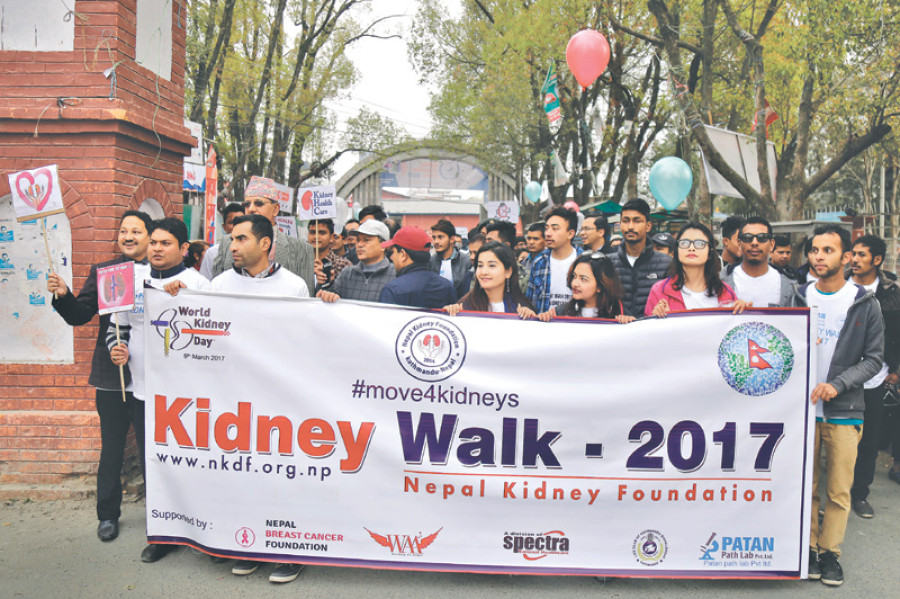National
World Kidney Day: Govt preparing to offer free transplantation
The government said on Thursday it is working to offer free transplantation services to the patients of chronic kidney diseases.
The government said on Thursday it is working to offer free transplantation services to the patients of chronic kidney diseases.
If everything goes as planned, Bir Hospital and Tribhuvan University Teaching Hospital in Kathmandu and Human Organ Transplant Centre (HOTC), Bhaktapur are likely to begin the free kidney transplantation services starting April 14.
“We have been offering free dialysis and Rs 200,000 to people for transplantation,” said Health Minister Gagan Kumar Thapa. “A slight increase to the current amount will mean our hospitals can offer free kidney transplantation services.”
According to the estimates, one in every one million people might be suffering from some kind of kidney ailments. Among them, 400 to 500 people need kidney transplantation. A majority of people with kidney ailments however are diagnosed only in the last stage when their kidneys have failed, which means either they will have to survive on dialysis for life or they should undergo transplantation.
After a series of meetings, officials have reached a conclusion that the additional amount required for providing free transplantation will be earmarked from a fund that the government collects from tobacco tax.
The fund, as mandated by the law, should be invested only in health related programmes and the Ministry of Health will soon seek an additional Rs 500 million from the Ministry of Finance to start free transplantation services.
The MoH invests around Rs 1 billion each year in its free health programme that includes free dialysis, Rs 200,000 for people willing to undergo kidney transplantation and cancer patients among others.
The average cost for transplantation in all three government hospitals comes to the tune of Rs 400,000, while the government spends Rs 254,000 on a single patient on dialysis each year.
Experts believe that transplantation can be the most sustainable solution as it improves quality of life of patients.
For people undergoing dialysis, frequent visits to hospitals and hours of hospital stay during the procedure hampers the quality of life.
“Kidney transplantation should be the first priority. Dialysis should be the priority for those who cannot undergo transplantation or for those who are suffering from other chronic illness elderly,” said Dr Pukar Chandra Shrestha, the director of HOTC.
While transplantation remains an urgent issue among the patients, Minister Thapa urged the public to consider preventive measures.
Signs that may indicate renal disease
- High blood pressure (hypertension)
- Puffiness of the eyes, hands and feet
- Passage of bloody, cloudy or tea-coloured urine
- Presence of protein in the urine (uremia)
- Excessive foaming of the urine
- Frequent passing of urine during the night
- Passing less urine or difficulty passing urine
- Fatigue
- Loss of appetite or weight
- Persistent generalised itching




 14.24°C Kathmandu
14.24°C Kathmandu














